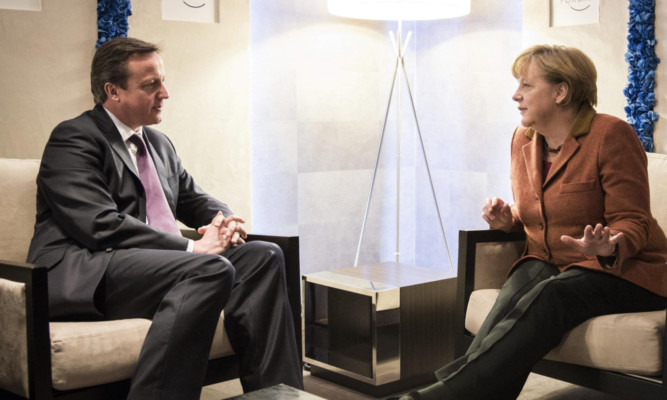Prime Minister David Cameron insisted Britain was not turning its back on Europe, as he met fellow EU leaders for the first time since announcing his plan to stage an in/out referendum on UK membership.
Mr Cameron held brief talks with several European leaders at the World Economic Forum in Davos, Switzerland, where he issued a warning that the EU must change because it is being “out-competed, out-invested and out-innovated” by rivals around the globe.
But in London, Deputy Prime Minister Nick Clegg renewed his assault on Mr Cameron’s “vague” and “implausible” plans to renegotiate the terms of Britain’s EU membership before staging a referendum by the end of 2017.
He said: “I simply don’t understand the point of spending years and years and years tying yourself up in knots, so-called renegotiating the terms of British membership in ways which at the moment at least are completely vague.
“I think that discourages investment and inhibits growth and jobs, which have to remain our absolute priority at a time when the economy is still struggling to recover.”
Labour leader Ed Miliband sought to clarify his own position on Europe, after appearing to rule out an in/out referendum in the House of Commons on Wednesday.
He said: “I am being clear. I do not think it makes sense, now, to commit to an in/out referendum years ahead.
“And the reason why it does not make sense is clear from what the priority of the British people is. Their priority is jobs and growth and living standards and I’ve got to say what I think the right priority is and I do not believe now it makes sense to commit to an in/out referendum.”
The Prime Minister discussed his proposals in a 15-minute meeting in Davos with German Chancellor Angela Merkel, who indicated she was open to a “fair compromise” with Britain, as well as speaking to the prime ministers of Italy, Ireland, the Netherlands and Denmark.
Dutch PM Mark Rutte later said: “The UK outside the EU would be an island somewhere in the middle of the Atlantic Ocean between the US and Europe. It would not be connected with any of those two.”
Irish Taoiseach Enda Kenny said: “Whatever happens, I would like to see Britain remain central to the EU for its future. It is very important in a global sense, when most of the big opportunities will arise outside the EU in the next 20 years.”
